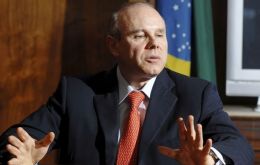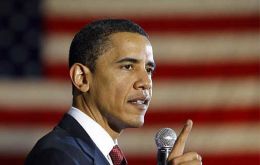MercoPress. South Atlantic News Agency
Economy
-
Saturday, April 17th 2010 - 06:36 UTC
As markets begin to normalize controversy over capital inflow controls resurfaces

The International Monetary Fund has warned that an over reliance on capital controls could derail the current global recovery. Although admitting that it may be a good idea for one country to apply controls on capital inflow, as the levy imposed by Brazil, “it could encourage too many others in the region to follow suit”.
-
Saturday, April 17th 2010 - 06:34 UTC
Brazil considering tax breaks and lower import tariffs to fight inflation

Brazil is considering additional anti-inflationary measures such as tax breaks and lower import tariffs but monetary policy remains the main tool to control prices, Finance Ministry officials said on Friday.
-
Saturday, April 17th 2010 - 06:29 UTC
Argentina’s “next step” is to negotiate 7.5 billion debt with the Paris Club

After unveiling Argentina's debt-swap details Thursday, Economy Minister Amado Boudou said on Friday that the next step is to negotiate the 7.5 billion dollar debt Argentina maintains with the Paris Club.
-
Saturday, April 17th 2010 - 06:23 UTC
Egypt expects to sign free trade agreement with Mercosur next July

Egypt expects to complete free trade negotiations with the four Mercosur countries -- Brazil, Argentina, Uruguay and Paraguay -- in July, Egypt's trade minister revealed this week in Cairo.
-
Saturday, April 17th 2010 - 06:19 UTC
Taxpayers will no longer be hostages of banks “too big to fall” promises Obama

US President Barack Obama has proposed significant new curbs on the activities of banks to try to prevent future financial crises. The plans - the most far-reaching yet -include limits to the size of banks and restrictions on riskier trading.
-
Saturday, April 17th 2010 - 03:12 UTC
Reconstruction efforts will turn Chile from capital exporter to importer, says IIF

Increased external financing requirements to cover reconstruction costs triggered by the earthquake and tsunami of February 27 will shift Chile’s external position from capital exporter in 2009 (largely the result of its dynamic private pension system) to capital importer this year and next, according to the Institute of International Finance, IIF.
-
Friday, April 16th 2010 - 23:40 UTC
US regulator accuses Goldman Sachs of defrauding investors

Goldman Sachs, the Wall Street powerhouse, has been accused of defrauding investors by United States’ financial regulator. The Securities and Exchange Commission (SEC) alleges that Goldman failed to disclose conflicts of interest.
-
Friday, April 16th 2010 - 04:17 UTC
Argentine bonds’ swap could not be sufficient, warn anks

In spite of Argentine authorities optimism regarding the 20 billion USD bonds’ swap launched on Thursday the Institute of International Finance, (IIF), warned that the initiative could be insufficient to re-establish the country’s full access to voluntary money markets.
-
Friday, April 16th 2010 - 04:09 UTC
Argentina launches defaulted bonds swap with a 66.3% discount

Argentina offered new bonds to holders of 20 billion US dollars of sovereign debt left out of an earlier settlement, seeking to end a nine-year default and regain access to international capital markets.
-
Friday, April 16th 2010 - 00:10 UTC
China agrees to invest heavily in Brazilian infrastructure

China and Brazil bolstered their growing ties with trade and investment agreements on Thursday in Brasilia before a summit of the world's top four emerging markets that was cut back after China's leader decided to return home to deal with a major earthquake.
